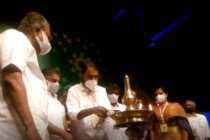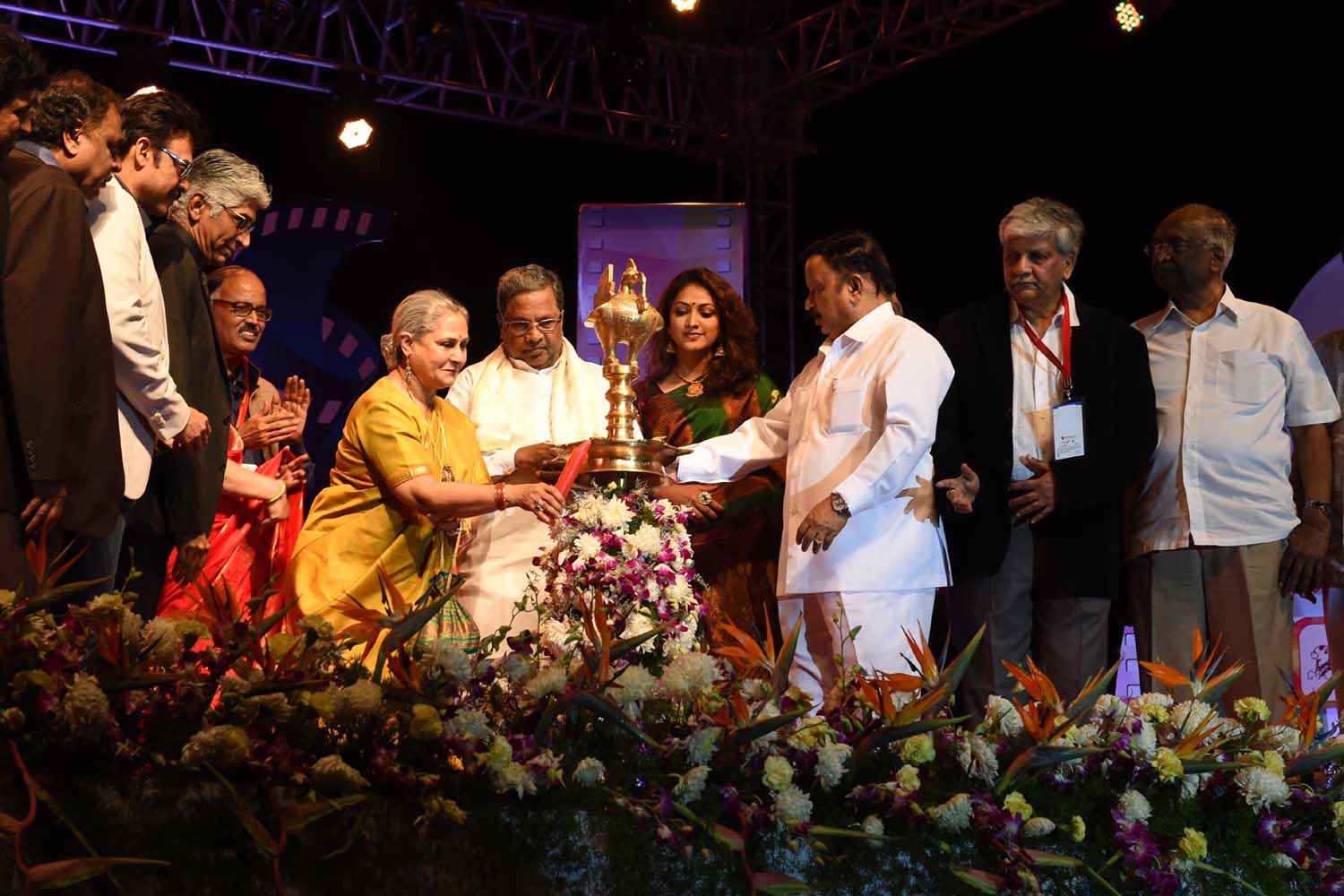Cinema makes absence presence. What is absent is made present in cinema. A director’s mind creates it and actor’s mind believes it. It is in this vacuum of complexity between the creator’s mind and the collective viewership psyche that cinema features.” Psychoanalytic Film Criticism – Overview & Prospects – Ujaan Ganguly
Mithya, the Kannada film, by debutant director young techie turned film director Sumanth Bhat, I propose to state is a rather very problematic, perturbing and to put it bluntly, perplexing piece of film. This, despite the fact, it eschews the commercial formula which spews out distasteful dross regimentally in the mistaken belief they are peddling entertainment.
I find it rather disturbing and dubious in the desultory manner the aspirational engineer-turned-film director has sought to approach the serious issue of mental and psychological trauma and its deleterious effect on the affected. In this case a young adolescent bereaved boy.
There are several reasons for me to find the film rather poorly scripted as also ill-conceivably executed. It is understood films greatly influence audiences irrespective of age and gender, one’s cultural and social upbringing.
Given this aspect of cinema’s pervasive influence on public perception, on what audience receives and assimilates, it becomes imperative for the film maker to be that much more responsibly conscious of his conception, and how it would be received and perceived.
Merely drawing from one’s real life experience, and seeking to understand how they “grieve” over a loss, as he puts it, and ironically, concedes himself “we mostly underestimate the emotional maturity of the children and their capacity to grasp complexity,” one would have expected similar approach by the director himself.
Given, as he further claims, “we dumb down films for them(children). I did not make this movie keeping in mind any specific age group. Just the fact things need to be explored from a children’s perspective,” he says in an interview with IANS. Laudable as his intentions are, but that is precisely where the director has failed both himself and his intended audiences as this proposition wishes to elaborate and elucidate upon.
For, the fallacy of most Indian films is that where discretion and nuanced visual narration is imperative and suffice, film makers take to literally verbalising – both with dialogues and scenes constructed – which is what makes Mithya a rather troublesome feature.
That at the pivot of its narrative, is a young school going boy, 11-year-old, on the cusp of adulthood, it becomes incumbent upon the film maker as to how meaningfully he conveys his thematic concerns, especially to children and young adults, among audiences, without impinging their minds.
The film, as one can notice, seeks to bring before audiences the psychological trauma the boy is suffering from, following the death of his parents. While his mother has hung herself (incidentally we learn he is a witness to it) following the death of her husband, whose circumstances see several conjectures by the man’s families. The lad itself refusing to let out any details despite repeated enquiries by the uncle, who has adopted him, on what led to the double tragedy.
Following the double calamity, he is taken in by his aunt and uncle, from Metropolis Mumbai to small town Udupi where the uncle is an autorickshaw driver and the aunt a beautician. The now orphaned boy becoming an addition to the two girl children who constitute the family totally removed from his high developed and sophisticated urban moorings.
The boy, the film maker gives us to understand, is yet to come to terms with the loss of his parents. Much as his aunt and uncle try to make him feel wanted and their own, the bereaved boy, who, answers their queries, and endearments, with unnatural stoic silence, plays aloof defiantly and highly affronting and offensive in his conduct, to say the least. That he rarely reciprocates kindly to the kids who readily take to him, is rather, hard to comprehend, much as traumatic he may be with his troubled psyche.
That every kind, paternal and filial gesture by the family members is not only frowned upon but also taken offence to, is indigestible. If so averse to their very company he could have refused them and stayed on with his paternal relatives who are more than eager and exuberantly enthusiastic to have him.
With few staccato scenes the director seeks to sketch the boy’s psychotic state which are neither convincing nor acceptable or hardly convincing as a character study. From the troubling shot of him standing near the door of whizzing train unattended, to his refusal to let his aunt carry his backpack on reaching home or expressing astonishment at being told he take their bigger girl’s bedroom. Be it standing alone on the bridge over the river while enroute to school when his friend asks him how his parents had died.
The rattling of the fan in his room to indicate his mother hung from the fan at their home. Or for that matter the theft of money and mobile of his aunt/step mother Jyothi, or later on the young Vandana playing with the nail cutter in the company of her indifferent “brother” or toying with a sharp pencil in hand as also a screwdriver at the shelter home where he is admitted while the families dispute where he will stay. More so, the silly act of pouring the water down on couple of occasions when asked to take bath or tidy and make himself clean after a rendezvous with his school mate Kishan.
The thrust of my argument is the film maker’s iterative scene play throughout the film, without any conflict at all, even the slightest one, with those around him, except one instance, to press home boy’s pain, pang and psychological trauma, is really fallacious and beguiling to accept. The instance being when he gets into a tiff with the neighbouring school boys who taunt him for the girl’s cycle he rides to school with “ladybird” cycle rider.
While it is understandable that trauma ridden person withdraws into a shell and is given to PTSD (post-traumatic stress disorder) especially in the absence of empathy from those around him/her, here the director does not believe in any progress to the positive despite all around him have so heartily embraced him and made him their own. This strikes as a serious lapse of the director.
The only show of any disposition towards striking semblance of friendship he expresses is towards his school mate with whom he rides to school as also explore the various parts of the neighbourhood. During one such sojourn we are given to understand that he has already been exposed to porn on mobile and informed that their place of tryst fills up during monsoon into a nice little rivulet.
Imagine the incongruous dialogue between two adolescents who have hardly graduated into bosom buddies sharing secrets. Kishan asks Mithya: Are you a man already? And while showing him the clip singing Kamalana langa jala jala…… with risqué connotations. To which Mithya replies: I have already aware of these. Earlier too, at the family’s lunch, when Mithya says he does not much like his new government school the uncle/father Surya interjects with a risqué joke “there are no good looking girls in his class,” as if to break ice with the still intransigent Mithya.
This being the case, how does the “ungrateful” lad repay the kindness of his new parents, more so, his new young siblings, one of whom he learns, was adopted by his parents, who badly wanted a girl child, but had a boy in him. The new mother going to the extent of even fetching him a new boy’s cycle and the father assuring the young, uncertain, still delinquently behaving boy, “I love all three of you – Anu, Vandana and Mithun.”
Not only does he forcefully pushes the child at home when seeking to sleep with her brother, but also at the seashore when she rushed to play in the sea water. On another occasion while pretending to play with the young Vandana he hurts her with the iron ruler. While a shocked Surya benignly reprimands him “What’s wrong with you? Isn’t she your sister?”
To which he haughtily retorts: She isn’t my sister. She is your daughter. An agitated Surya, the wounded adoptee dad asks: What? Who told you that? You are no lesser than them to me. In fact, you are the son I always wanted. His (Surya’s) sexist reasoning being it is easier to rear a male child without difficulty.
In fact, the boy Mithya overhears that his parents had adopted Vandana and now questions Surya, Why did they want Vandana? Why adopt her from you all? Everything was honky-dory till she arrived. She ruined everything, pinning her for the tragedy that has befallen him.
Actually, it is difficult to envision such a “mature” young person seeking to avenge himself in such a manner over the death of his parents, more so, being aggrieved that his parents took the young Vandana into their family.
The last straw of Sumanth’s inexplicable and unacceptable explicit visual narrative being Mithya takes the young Vandana entrusted to his care by the trusting family to the spot which is now brims with flowing water and leaves the child in the middle of the water to drown.
None of the mise en scene that Sumanth Bhat constructs in order to convey the Mithya’s “unduly” agitated state of mind and his trying to find closure to the tragedy that has surrounded him is very troublesome and unwarranted.
The film maker could have adopted to subtlety and nuanced measures to convey the inner workings of the troubled mind, which could be still easily deducible without the overt visual play he has gloriously indulged in, thereby rendering his film out of reach of the impressionable young adults.
One other fallacy of the film is that the abject lack of conflict between the parties concerned as also certain sense of parental reprimand and punishment. For such a person, as “demonic” Mithya turns out to be with his “devilish” deeds, normally would be punished, making him learn and accept the meaning of socially acceptable conduct and behaviour.
None of his excessive reprehensible doings are questioned by the parents given that they become aware of his misdemeanours, the film maker tries to pass it off as routine and reductive doings of a maladjusted mind still grappling with the reality of things around him warranting any adult interventions at all.
It is here one must observe that Iranian films and its film makers have made it a fine art working with children as principal protagonists. The children in Iranian films become metaphor to all that the filmmaker seeks to put across against the political establishment or highlight the social cultural situation in that country in the most subtle and perspective manner.
Done more so to escape the regimental censorship films face by the authoritarian State there. There is none to surpass Iranian film makers when it comes to children as subjects who deliver the intended message with that elfin charm. In fact, it seems a blessing that the restrictions imposed by the government on filmmakers in Iran has forced the artists to seek out more creative ways of telling their stories.
Without resort to any overt visual depictions, the emotions behind a child’s anger or pain are conveyed to the viewers in the most succinct and subtle manner, even as children form the fulcrum of the film’s social critique of the nation State.
In hindsight one would like to press home the point that Mithya demanded a totally different visual grammar and idiom than adopted by director Sumanth Bhat. I am sure he has schooled himself on the various aspects of the cinema aesthetics and engagement and idea of cinema which is evident in his choice of theme and narrative structure adopted.
But it seems he has not put to good use his learning leaving Mithya a much to be desired movie though thanks to some excellent and evocative cinematography by Udit Khurana and minimalistic background score by Midhun Mukundan the film draws you into its emotive dramaturgy but with the misgivings of Sumanth Bhat’s missteps.
By…

S Viswanath is veteran Film Journalist / Critic & involved in various key capacities at many International Film Festivals circuits across the Globe also co-author of book ‘Random reflections: kaleidoscopic musings on Kannada cinema










Leave a Reply